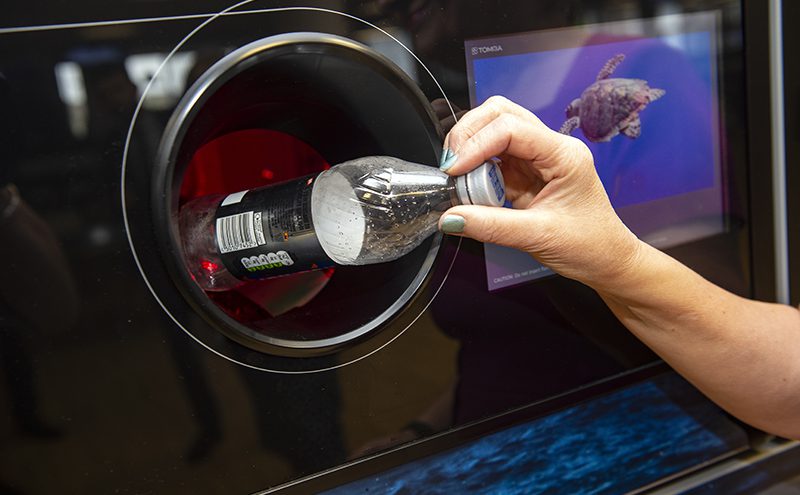
Members of the public are being called upon to have their say on how deposit return could work best for Scotland, as Zero Waste Scotland, Scotland’s circular economy expert body, hosts its first public engagement event on the matter at Glasgow Fort.
Under a deposit return scheme, customers pay a small deposit when they buy drinks in, for example, a bottle or a can and then get the deposit back when they return the empty container for recycling.
A public consultation on a Scottish deposit return scheme was officially opened by the Scottish Government on Wednesday 27 June, 2018.
Zero Waste Scotland has been tasked by the Scottish Government with designing options for Scotland’s deposit return scheme, and has prepared four examples of how different choices could work together. These are available to view in the public consultation document. They are there to help people understand how a scheme could work, and make an informed choice about what they would prefer.
Iain Gulland, Chief Executive, Zero Waste Scotland, said:
“We will be at Glasgow Fort to talk to people about deposit return, discuss what it might mean for Scotland, and encourage everyone to contribute their views and tell us how it could best work for you and your family. This is the first in a number of public engagement events we will be running over the summer. With a public consultation now live, we want as many people as possible to have their say before the consultation closes in September.”
Scotland is dedicated to decisive action on single-use items. The Scottish Government has pledged to match the EU’s commitment to require all plastic packaging to be 100% recyclable by 2030, announced a ban on plastic-stemmed cotton buds, banned microbeads, and set up an expert panel to provide advice on items symbolic of our current throwaway culture – such as disposable cups and plastic straws.
Scotland remains the only devolved nation to commit to a deposit return scheme, which fits clearly into the nation’s vision for a more ‘circular’ economy in which products and materials are made to last.
Iain Gulland continued: “Single-use items are a huge issue in Scotland and across the world, with more than two billion drinks containers in circulation in Scotland alone – around 694million of which are plastic bottles.
“As a nation we currently only recycle around half of the drinks containers we consume – yet deposit return has enormous potential to increase recycling and reduce litter – as well as bringing economic benefits, including job creation. This is a landmark step in Scotland’s ambitious goals around ‘making things last’. I encourage everyone to make their thoughts known on deposit return – and help shape the best possible scheme for Scotland.”
Glasgow Fort has recently become an ambassador for Zero Waste Scotland’s Resource Efficiency Pledge – which is supported by the European Regional Development Fund (ERDF) – demonstrating the shopping destination’s commitment to improving and advocating sustainability.
Philip Goodman, Centre Director, Glasgow Fort, said:
“Glasgow Fort is delighted to mark the start of public engagement on Scottish Government proposals for a bottle deposit return scheme in Scotland. Single-use plastic is a major environmental concern and this work aims to bring the community together to work on the best solution to reduce waste.
“Environmental sustainability is a key focus at Glasgow Fort. We’re incredibly proud to have recently become a Resource Efficiency Ambassador, which has involved us making a pledge to Zero Waste Scotland’s Resource Efficiency programme. We look forward to working with our partners here at Glasgow Fort to meet those sustainability goals.”
Cabinet Secretary for the Environment, Climate Change and Land Reform, Roseanna Cunningham, said:
“A deposit return scheme for Scotland has a vital role to play in changing behaviour towards single-use items for good, and accelerating a more circular economy.
“The Scottish Government, with support from Zero Waste Scotland, is committed to establishing the best possible deposit return scheme for Scotland – and we need input from as many people as possible to do that. I’m delighted that we’re now in a position to begin gathering views, both through the public consultation and Zero Waste Scotland’s community activity over the coming months.”
Over the summer Zero Waste Scotland will be hosting a series of events aiming to raise awareness of Scotland’s commitment to introduce a deposit return scheme and engage the public on the matter. The range of events will vary, including those in communities, at major summer events, in areas of high footfall, and some organised in partnership with schools and businesses.
More information on deposit return, including a link to the public consultation, is available on the Zero Waste Scotland website at www.zerowastescotland.org.uk/deposit-return-scheme







